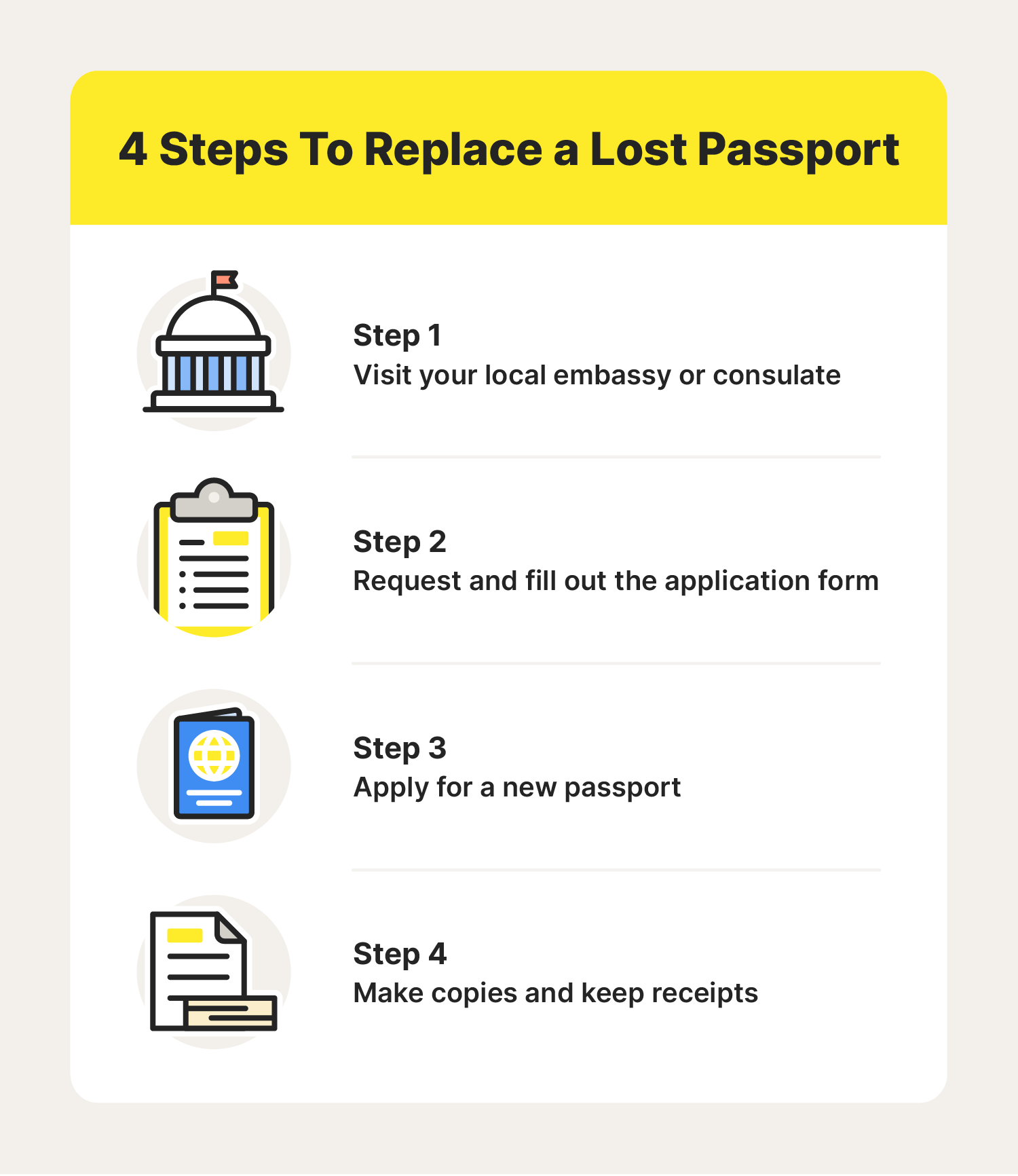Losing your passport is a stressful experience, but knowing how to report it will not only help you get a replacement quickly but also prevent potential identity fraud. Unfortunately, lost passports can become tools for identity theft, leading to financial and other security issues. Follow this guide to learn what to do if you lose your passport, and how LifeLock Standard can help shield you from identity fraud.
A lost or stolen passport can lead to many problems, especially for your identity. Learn what to do when you lose your passport with these four essential steps for reporting it and getting a replacement, including:
- Step 1: Report the loss
- Step 2: Gather required documents
- Step 3: Apply for a new passport
- Step 4: Make copies and keep receipts
Reporting the loss of your passport is the first step to take when you discover it's missing. Swift action is important when your personally identifiable information is compromised. There are both in-person and online methods to report your lost passport. While you should contact local authorities in the country you’re currently in, you have the option to apply for a replacement passport in person at an embassy and consulate or online.
Contact local authorities
Reach out to local authorities, such as your nearest police station, to report your lost passport, as this will make it easier to trace the passport back to you if it’s found. Include information like the time and date of the loss and other notable physical aspects.
Notify an embassy or consulate
Whether you’ve lost your passport at home or abroad, you should contact your country’s embassy or consulate upon noticing you’ve lost your passport. They will provide the most applicable information in obtaining a replacement.
| Tip: If you’re in a hotel, the concierge and reception should have the contact information of the nearest embassy or consulate. |
Apply online
Locate your country’s embassy/consulate government website for specific instructions on how to report a lost passport online. This usually entails filling out a detailed form with your personal information.
Online reporting is especially helpful if you discover you’ve lost your passport outside of regular business hours or if you’re unable to visit an embassy in person.
You must provide specific personal documents to verify your identity and support your lost passport application. These will help ensure the safe issuing of a replacement passport to the right person and avoid the lasting effects of identity theft.
Required documents will vary depending on the country, but these are some of the most commonly requested documents:
Government-issued photo ID
Common forms of government-issued photo IDs include driver’s licenses and national identity cards. They should not be expired and should be in relatively good condition.
Proof of citizenship
Documents that will verify your citizenship commonly include your original birth certificate, naturalization certificate (if applicable), or a previous/expired passport.
Passport photo
The application process will also require a recent passport-sized photograph. Embassies and consulates set the photo dimension specifications, so be sure to check the correct format for your location.
Once you’ve gathered the necessary documents, you can start applying for a new passport. If you’re applying online, be sure you’re on the official government website to prevent your personal info from being used for identity theft.
Here are the steps to apply for a passport in person:
- Visit your local embassy or consulate.
- Request and fill out the application form.
- Pay the fee and submit the application.
And here’s how you can apply for a passport online:
- Visit the official embassy/consulate government website.
- Access the application form and upload your documents.
- Pay the fee and submit the application.
Make copies and keep receipts of the applications you’ve submitted to local authorities and embassies or consulates. These documents will often have unique reference numbers that you can later use to keep track of your passport status.
Make sure to also keep receipts of the payments you’ve made throughout the application process to safeguard your application status and keep an organized trail toward your new replacement passport.
How to prevent a lost or stolen passport
The best solution to a lost or stolen passport is prevention. Accidents can happen to anyone, but below are some tips to consider to ensure the safety of your passport.
- Avoid leaving your passport openly unattended in hotel rooms, a common scene for identity theft.
- Store your passport in a secured safe or locked compartment.
- Avoid having it with you unnecessarily when traveling, such as when sightseeing or dining.
- Consider using radio frequency identification (RFID) protection to shield your passport from electronic pickpocketing and unauthorized scanning.
While prevention best practices are beneficial, accidents happen to the best of us, so don’t feel discouraged or overly panicked when you have a lost passport. Instead, implement the steps above, and you’ll get back on track with your travel plans and a replacement passport.
Help safeguard your identity with LifeLock Standard
If your passport is ever lost or stolen, the effects can be devastating. Identity fraud can negatively impact your finances, and the longer you’re unaware of unauthorized usage of your identity, the more identity thieves can exploit the situation.
The best defense against identity theft is proactive security. LifeLock Standard closely monitors fraudulent use of your identity in case your personally identifiable information (such as your full name, Social Security number, driver’s license number, bank account number, passport number, phone number, or email address) is compromised.
FAQs about lost passports
Still have questions about what to do if you lose your passport? We have answers below.
What if my passport gets lost in the mail?
Contact the embassy/consulate and postal service responsible for handling your passport delivery to report the loss. Provide the relevant reference and tracking numbers.
The government agency responsible for issuing your passport will provide you with the necessary steps to obtain a replacement passport.
What should I do if my passport expires?
Renew your passport as soon as possible. Many countries require valid identification outside of travel, and passports can act as a verifiable ID. Visit your country’s embassy or consulate or their official website to start the renewal application process.
How quickly can a lost passport be replaced?
The processing time for a replacement passport will vary depending on the country and the type of issuing service. Standard processing times can range from ten to twelve weeks with expedited processing services ranging from four to six weeks.
Can I use my passport if it’s damaged?
Undamaged passports are required for international travel. If your passport has significant damage, such as torn or missing pages, it may be deemed invalid by immigration authorities.
What should I do if I lose my passport abroad?
Report the loss to local authorities, such as the police, and keep a copy of the police report. Contact your country’s embassy/consulate in the country you’re currently visiting to start the replacement passport application process.
What should I do if I find someone else’s passport?
Contact the nearest embassy/consulate of the passport holder’s country to report the lost passport. You will receive information and steps on how to return the passport safely. In many cases, you can drop off the passport at the embassy or consulate.






